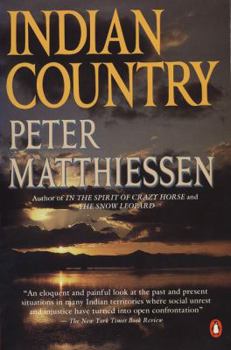Indian Country
Select Format
Select Condition 
Book Overview
After winning an eight year legal battle, here is the controversial book that powerfully sheds new light on the plight of Native Americans. Matthiessen's urgent accounts and absorbing journalistic... This description may be from another edition of this product.
Format:Paperback
Language:English
ISBN:0140130233
ISBN13:9780140130232
Release Date:March 1992
Publisher:Penguin Books
Length:352 Pages
Weight:0.87 lbs.
Dimensions:7.8" x 0.8" x 5.2"
Customer Reviews
4 ratings
Insight into Mathiessen's Psyche
Published by Thriftbooks.com User , 16 years ago
Mathiessen writes so beautiflly about Indians, birds, and peaceful natural settings. It was intriguing to read "Indian Country" after reading Mathiessen's "Shadow Country". "Indian Country" reveals Mathiessen's faith in those that revere nature and his detestation of those that plunder the land for the sake of foolish development. In reading "Shadow Country," I was struck with Mathiessen's creation of a Greek chorus (i.e., a democratic commentary by fellow residents on the drama being played out by the central tragic character). This profound democratic spirit is manifested in "Indian Country" as well. I appreciated Mathiessen's deft observation and portrayal of the facial expressions, manners, and gestures of the individual Indians with whom he met while researching "Indian Country."
Good treatment of modern land grabs, but with a hidden agenda that's not the one you think it is
Published by Thriftbooks.com User , 19 years ago
We are all familiar - - or should be - - with the white man's thefts of Indian land in the past. In this book, Peter Matthiessen demonstrates that such land grabs continue today, in a variety of more subtle forms. He focuses in particular on economic development of sacred sites of various sorts. In some of his chapters he also shows how legal disputes always somehow manage to go against Indian rights. The stories are depressing, but they can't all be taken at face value. Matthiessen consistently seeks out disgruntled people in each tribe, and treats them as if they alone were the true representatives of the tribe's rights. Sometimes that's true, since the elites and other "progressives" get bought out in various ways. But it isn't *always* true - - and sometimes disgruntled people are just generally annoyed for whatever set of personal reasons. Matthiessen's biases lead him to side with these people uncritically in every case. This selection of informants means that Matthiessen treats the leadership of the Eastern Cherokee favorably because they fought development, but treats the leadership of the Miccosukee poorly because they didn't. Similarly, Hopi who choose to have running water and electricity get short-shrifted in Matthiessen's worldview compared with those who choose not to have those things. I think it's clear what Matthiessen's ultimate agenda here and, despite what he wants us to think, it isn't necessarily solidarity with the tribes. As always, he writes very well. Matthiessen has also covered a very nice range of the challenges facing Indian Country, from Florida and North Carolina to the Pacific Northwest. The book represents a good follow-up to Dee Brown's "Bury My Heart at Wounded Knee," but the author's selective choice of informants should give the reader pause.
A Postscript to ?Bury My Heart at Wounded Knee?
Published by Thriftbooks.com User , 23 years ago
Peter Matthiessen's Indian Country serves as the postscript to Dee Brown's Bury My Heart at Wounded Knee. The threats to Native American societies detailed in this book are less bloody and horrific, but just as real as those perpetrated by the U.S. military. Yes, manifest destiny lives on in the halls of the U.S. government in the early 21st century, but with agencies like the BIA and the Department of Interior doing the nasty work.Along with all the hard-hitting research that Matthiessen brings to his writing, he's also at home with the natural history of Indian lands. He is subtle in the way he takes you with him on a walk through a working village or a ride to Black Mesa to get a truckload of household coal. Matthiessen spends time among the people living on the reservations, observing the slow encroachment of capitalism into their traditional ways of farming and trade, and ultimately seeing tribes divided into progressive and traditional factions. Matthiessen is guided by the self-described, "half-baked detribalized Mohawk...," Craig Carpenter. Carpenter serves in many instances as the ambassador between Matthiessen and the locals on the reservations. And because of Carpenter's national reputation many doors that are generally closed to white writers are opened for Matthiessen. Indian Country covers some dozen or so reservations in the United States. The sad revelation when you read through this book is every one of those reservations is confronted with a serious threat to the land they call home and a way of life they have know since being put on this earth.
A chronicle of continuing encroachments on Indian country
Published by Thriftbooks.com User , 25 years ago
Matthiessen is a methodical, although not disinterested, reporter of how the destruction of Native American culture was and continues to be attended by encroachments by and desecrations of their land (what little they've been left) by a society gone mad with greed.And how could anyone, journalist or not, remain disinterested in the face of such things? More journalists and writers should have Matthiessen's courage and conviction.






